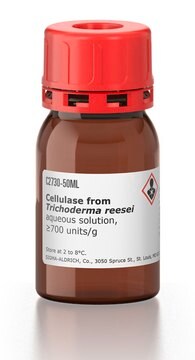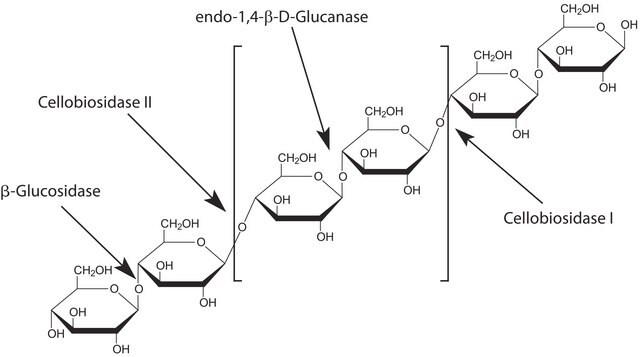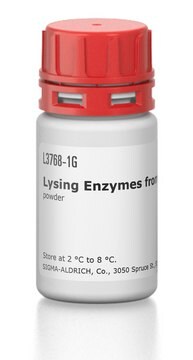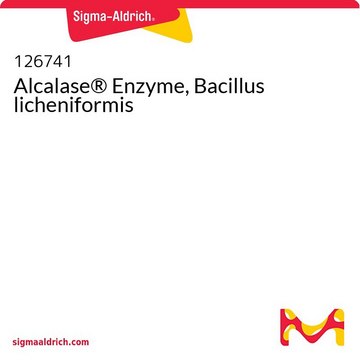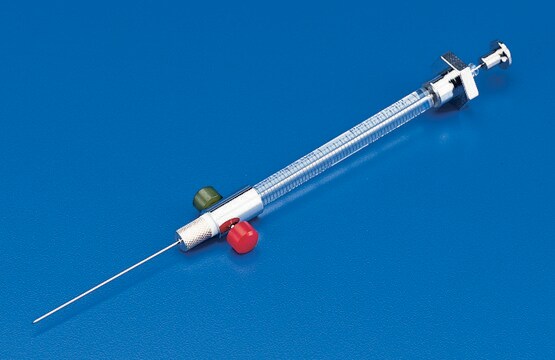V2010
Viscozyme® L
cellulolytic enzyme mixture
Synonym(s):
Cell Wall Degrading Enzyme Complex from Aspergillus sp., Lysing Enzyme from Aspergillus sp.
Sign Into View Organizational & Contract Pricing
All Photos(1)
About This Item
Recommended Products
biological source
fermentation/recombinant
Quality Level
form
liquid
enzyme activity
≥100 FBGU/g
technique(s)
protein extraction: suitable
density
~1.2 g/mL at 25 °C (lit.)
suitability
suitable for cell lysis
application(s)
cell analysis
storage temp.
2-8°C
General description
Viscozyme® L is a lignocellulose-specialized multi-enzymatic complex derived from Aspergillus aculeatus. It contains a wide range of carbohydrases, including arabanase, cellulase, β-glucanase, hemicellulase, and xylanase.
Application
Viscozyme® L has been used:
- in the extraction of polyphenol from grapefruit and unripe apples.
- to study the effect of its supplementation on nutritive value and silage characteristics of sunflower silage.
- for simulation of the fermentation process during in vitro digestibility of former food products (FFPs).
- for enzymatic treatment, to study its effects on the antioxidant properties of wheat bran.
Biochem/physiol Actions
Viscozyme L aids in the release of oil bodies and proteins from cells by degrading the hemicellulose, cellulose, and pectin molecules, and by breaking the cell wall components.
Features and Benefits
- Not a GMO and doesn′t contain GMOs.
- Made by fermentation of a microorganism.
- Improves process through faster, more efficient oil/water separation.
Legal Information
A product of Novozyme Corp.
Viscozyme is a registered trademark of Novozymes Corp.
Signal Word
Danger
Hazard Statements
Precautionary Statements
Hazard Classifications
Resp. Sens. 1
Storage Class Code
10 - Combustible liquids
WGK
WGK 1
Flash Point(F)
Not applicable
Flash Point(C)
Not applicable
Personal Protective Equipment
dust mask type N95 (US), Eyeshields, Gloves
Choose from one of the most recent versions:
Already Own This Product?
Find documentation for the products that you have recently purchased in the Document Library.
Customers Also Viewed
Estelle Couradeau et al.
PloS one, 6(12), e28767-e28767 (2011-12-24)
The geomicrobiology of crater lake microbialites remains largely unknown despite their evolutionary interest due to their resemblance to some Archaean analogs in the dominance of in situ carbonate precipitation over accretion. Here, we studied the diversity of archaea, bacteria and
Barbara M Auinger et al.
Applied and environmental microbiology, 74(8), 2505-2510 (2008-02-26)
Here we introduce a method for quantitative analysis of planktonic protists and microalgae from preserved field samples combining morphological and small-subunit (SSU) rRNA gene sequence analysis. We linked a microscopic screening with PCR of single cells using field samples preserved
Enhancing polyphenol extraction from unripe apples by carbohydrate-hydrolyzing enzymes.
Zheng, H.
Journal of Zhejiang University. Science, 10, 912-919 (2009)
Suvi T Häkkinen et al.
Frontiers in plant science, 6, 1035-1035 (2015-12-05)
Bioconversion, i.e., the use of biological systems to perform chemical changes in synthetic or natural compounds in mild conditions, is an attractive tool for the production of novel active or high-value compounds. Plant cells exhibit a vast biochemical potential, being
Paul Bikker et al.
Journal of applied phycology, 28(6), 3511-3525 (2016-12-31)
The growing world population demands an increase in animal protein production. Seaweed may be a valuable source of protein for animal feed. However, a biorefinery approach aimed at cascading valorisation of both protein and non-protein seaweed constituents is required to
Our team of scientists has experience in all areas of research including Life Science, Material Science, Chemical Synthesis, Chromatography, Analytical and many others.
Contact Technical Service